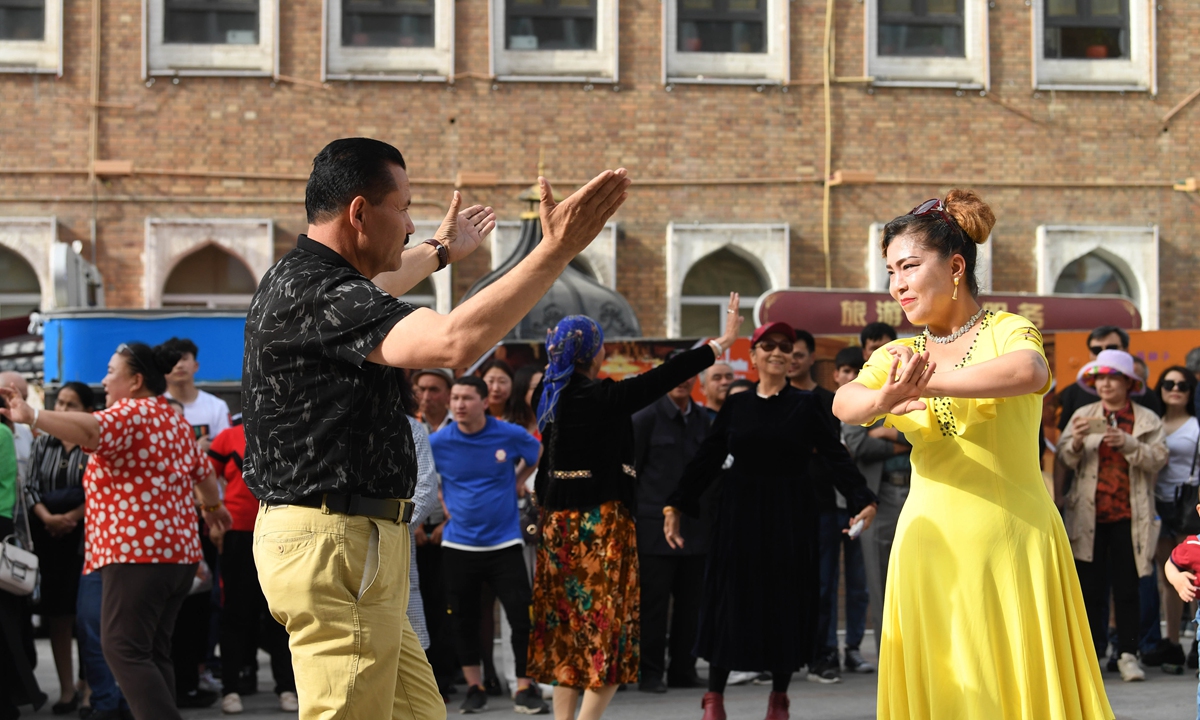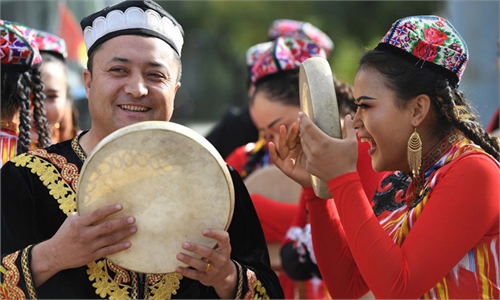
People dance outside the Xinjiang International Grand Bazaar in Urumqi, northwest China's Xinjiang Uygur Autonomous Region, May 22, 2019. (Photo: Xinhua)
A handful of EU and British politicians and pseudo-scholars have been maliciously spreading lies and false information about governance in China's Xinjiang Uygur Autonomous Region. In response, the Chinese government imposed sanctions on them. Then, under the banner of the so-called academic freedom, some EU and British scholars voiced their support for those sanctioned by China. The differences in the understanding of the Xinjiang question are worthy of further exploration.Although there are great differences between Chinese and European cultures, we have a common understanding of the standards of academic research. We can reach a consensus on the basic ethics of scholars.
But based on some anti-China institutions' fake data, those so-called researchers turn out to make a living by slandering China. They did not even conduct field investigations in Xinjiang, but they claim that "genocide" has happened in Xinjiang. They also claim that there are so-called concentration camps in the region, and that Uygur women have suffered from sexual abuses.
Ignoring the status quo of the large-scale mechanization of Xinjiang's cotton industry, they accuse Xinjiang of human rights violations such as "forced labor" and support anti-China forces that deliberately disrupt Xinjiang's development. Their acts have violated the most basic moral bottom line and professional ethics of scholars.
Terrorism is the public enemy of humanity, and a challenge to the bottom line of morality. Fighting against extreme terrorism and maintaining stability in Xinjiang is the common wish of people of all ethnic groups. Ridiculously, some countries represented by the US have implemented double standards, deliberately equating the Chinese government's anti-terrorism methods to violating Uygurs' human rights in Xinjiang.
In terms of the development of European civilization, academic freedom is indeed a precious cultural achievement. The problem is whether there is any boundary that academic freedom must follow? Can the right to freedom exempt society from its obligations?
Two years ago, a colleague from Oxford University shared some unspoken rules in Western universities. He told me that if a university scholar discusses or studies any anti-feminism discourse, he or she may lose their job. Similarly, any debate on race diversity will be perilous, as the wrong move with political correctness will ruin a scholar's academic future.
Absolute academic freedom is an illusory imagination. Academic freedom should not be reduced into an umbrella of pseudo-academics. Genuine scholars should assume the basic social responsibility and obligation - narrating their study results based on facts. Lies and slanders have nothing to do with academic freedom. Their sole result is to fool the public. This will deepen estrangement between various nation states.
There are divergences in the understanding and practices of academic freedom in universities between China and Europe. In the past four decades, China's model of modernization has achieved a remarkable success. China has formed a set of theories and mechanisms for modernization that are consistent with its national conditions. Chinese are fully confident of its national cultures and traditions.
However, the Chinese government has always attached great importance to the theoretical achievements of modernization developed by European civilization. China's increasingly open universities welcome foreign scholars to exchange with us on the basis of equality, mutual benefit and mutual respect.
The Chinese government has sanctioned individuals and entities in the West who deliberately slander the Chinese government's practices in Xinjiang, which triggered controversy in European academic community. This illustrates that China and Europe need to have more in-depth dialogue and exchanges. Groundless lies will disappear as long as the two sides can put aside their prejudices and look at each other with an open mind.
The author is a scholar at Shanghai International Studies University. opinion@globaltimes.com.cn



